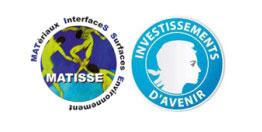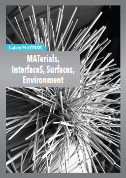Preparation and developments of mesoporous materials using molecularly assembled structures

5 juillet 2017 de 10h30 à 12h
Campus Jussieu
Couloir 32.42, salle 101.103
Current position :
Department of Applied Chemistry and Kagami Memorial Research Institute of Materials Science and Technology, Faculty of Science and Engineering, Waseda University Ohkubo 3 - 4 - 1, Shinjuku-ku, Tokyo 169-8555, Japan
Abstract of the presentation :
This presentation will introduce the preparation and developments of mesoporous materials using molecularly assembled structures composed of organic substances. Mesoporous materials are recognized as a class of materials with great diversity. The pore size of mesoporous materials is relatively large with uniform pore size, high surface area, and variable compositions. The compositions include silica, carbon, transition metal oxides, metals, alloys, organic substances, polymers, and metal complexes, while various porous mesostructures, such as honeycomb like ones, are known. The developments of mesoporous materials have significantly contributed to various scientific fields, including adsorption, separation, catalysis, organic synthesis, polymer chemistry, and so on. In fact, the number of publications on mesoporous materials has been increasing over 25 years, which means the wide spreading developments of the materials into various fields in science and technology. Morphological control of mesoporous materials, such as thin films, fibers, and nanoparticles, is also critical toward applications. Colloidal mesoporous silica nanoparticles have attracted keen interests in nanomedicine. They are expected as not only drug delivery carriers but also high performance biomedical nanoparticles. Recently it has been clarified that platinum nanoparticles supported on mesoporous silica can catalyze ethylene gas generated from vegetables, which deteriorates the freshness of fruits and vegetables, to carbon dioxide even at 0oC, and new home refrigerators equipped with this catalysis system are now in market. Mesoporous materials will be further developed as useful materials contributing to both academics and practical applications
Egalement dans la rubrique
MATISSE en chiffres
- 4 disciplines : Chimie, Physique, Sciences de la Terre, Patrimoine
- 400 permanents
Contact
Direction
Florence Babonneau
Administration
Communication
Emmanuel Sautjeau



